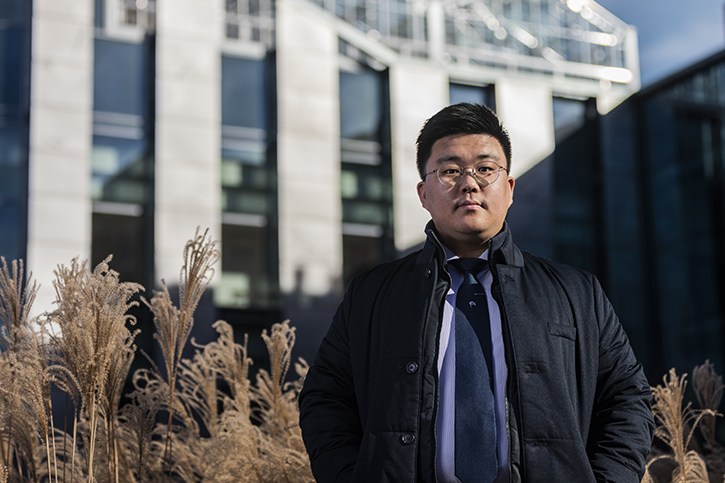
Seong Jae Shin. Photo by Lathan Goumas/Strategic Communications.
A lifelong passion or self-analysis may give hints for what one should study in college. For George Mason University senior Seong Jae Shin, his decision came about because of a revolution.
“[Seeing the Arab Spring in Egypt was] one of my turning points” the conflict analysis and resolution major said.
When Shin saw how the Egyptians shifted from accepting the status quo to wanting to have a voice and be heard, he was inspired.
“Seeing how one conflict can change an entire perspective for everyone—for a person—that became one of the topics that I wanted to look into,” he said.
Shin was a sophomore in high school when he witnessed the protests in Egypt—which he moved to from South Korea when his father had to travel for work—but the experience stuck with him. After he moved back to Korea to put in his two required years in the Korean military, he discovered Mason Korea and thought it was a great opportunity to continue his education.
“From day one of the [conflict analysis and resolution] program, [Shin] was much more mature than the other students and always had a thirst for knowledge,” said Roland Wilson, Shin’s professor from Mason Korea who encouraged him to study the field. “Just as importantly, he was always willing to work extra hard to ensure he was a top scholar and did all he could to support the other conflict analysis and resolution students in the program.”
Shin also supported the launch of a satellite branch of the Schar School of Policy and Government’s Center for Security Policy Studies at Mason Korea while studying with center Director Soyoung Kwon. Her courses sparked his interest in international security, which he plans to study further in graduate school after completing his undergraduate degree.
“[Shin’s] strengths, to name a few, are his global experience and knowledge, passion for learning, good work ethic and leadership,” she said.
Now that Shin is studying in Fairfax, Virginia, to have access to job opportunities in the United States, his global experience continues to grow. Mason’s global diversity is evident every time he walks across campus.
“I think that’s an amazing thing,” he said. “Diversity is important for me because I grew up in a nonmotherland.”
At the time, it was uncommon for Asians to be living in Egypt, and he often felt out of place when people would poke him or pinch his hair in curiosity.
From his experiences around the world, he realized conflicts can be caused by cultural differences, and he became interested in informing people how diversity can remove these boundaries. Beyond physical appearances, a deeper understanding of one another removes boundaries that hinder peace, Shin said.
“Diversity itself educates the people,” Shin said. “Our school does a great job of preparing all its students [in this regard].”
